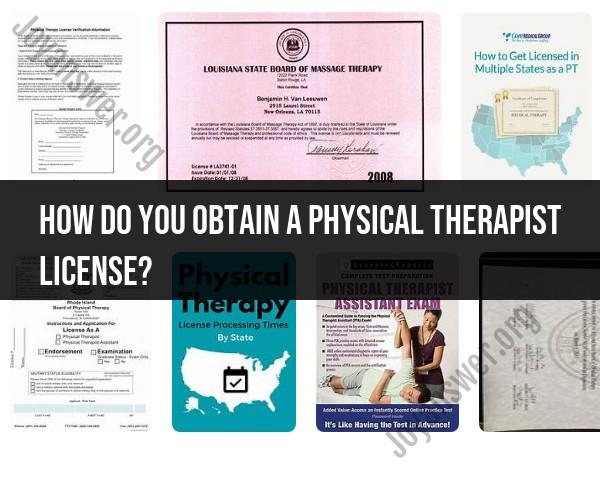How do you obtain a physical therapist license?
Obtaining a license as a physical therapist typically involves completing the necessary educational requirements, gaining clinical experience, and passing a licensing exam. The specific steps may vary by country, state, or region, so it's important to research and follow the requirements of the location where you intend to practice. However, here is a general overview of the process to obtain a physical therapist license in the United States:
Educational Requirements:
- Obtain a Doctor of Physical Therapy (DPT) degree from a program accredited by the Commission on Accreditation in Physical Therapy Education (CAPTE). DPT programs usually take three years to complete after earning a bachelor's degree.
Clinical Experience:
- Participate in clinical internships or rotations as part of your DPT program to gain hands-on experience in various clinical settings.
National Physical Therapy Examination (NPTE):
- After completing your DPT program, you must pass the National Physical Therapy Examination (NPTE). The NPTE is a standardized exam administered by the Federation of State Boards of Physical Therapy (FSBPT). It assesses the basic knowledge and skills required for entry-level physical therapy practice.
State Licensing Board Application:
- Contact the physical therapy licensing board in the state where you wish to practice. Each state has its own licensing requirements, so you must apply for licensure in the specific state or states where you intend to work. The application process typically involves submitting your educational transcripts, NPTE scores, and an application fee.
Background Check:
- Some states may require a criminal background check as part of the licensing process.
Jurisprudence Exam:
- Certain states also require applicants to pass a state-specific jurisprudence exam to test their knowledge of state practice laws and regulations.
Continuing Education:
- Many states have continuing education requirements for licensed physical therapists. You'll need to complete a specified number of continuing education units (CEUs) during each renewal period to maintain your license.
License Renewal:
- To continue practicing as a licensed physical therapist, you must renew your license according to your state's requirements. This typically involves submitting renewal forms and paying a renewal fee.
It's essential to stay informed about the specific licensing requirements and regulations in the state or region where you plan to practice. Additionally, remember that licensure for physical therapists in the U.S. is state-specific, so you may need to go through the licensing process in each state where you intend to work if you plan to practice in multiple states.
Before pursuing a career as a physical therapist, consider joining professional organizations like the American Physical Therapy Association (APTA) for valuable resources and networking opportunities in the field.
What are the educational requirements for obtaining a physical therapist license?
To obtain a physical therapist license, you must complete a Doctor of Physical Therapy (DPT) program from an accredited institution. The DPT program is a three-year, full-time program that includes coursework in anatomy, physiology, neuroscience, pathology, and pharmacology. In addition to coursework, DPT students also complete clinical rotations in a variety of settings, such as hospitals, outpatient clinics, and schools.
How do I apply for a physical therapist license in [Your State]?
Each state has its own requirements for physical therapy licensure. To apply for a physical therapist license in your state, you must first contact the state board of physical therapy. The state board will provide you with information on the specific requirements for licensure in your state.
In general, most states require physical therapists to pass the National Physical Therapy Examination (NPTE) and to complete a certain number of hours of continuing education each year. Some states may also have additional requirements, such as a minimum number of hours of clinical experience.
To find out the specific requirements for applying for a physical therapist license in your state, you can visit the website of the Federation of State Boards of Physical Therapy (FSBPT). The FSBPT is a national organization that represents state boards of physical therapy.
What exams and certifications are necessary for obtaining a physical therapist license?
Most states require physical therapists to pass the National Physical Therapy Examination (NPTE) in order to obtain a license. The NPTE is a standardized exam that assesses the knowledge and skills of physical therapists. The NPTE is a computer-based exam that consists of 250 multiple-choice questions. The exam covers a wide range of topics, including anatomy, physiology, neuroscience, pathology, pharmacology, and physical therapy practice.
To pass the NPTE, you must score a 75% or higher on the exam. You can take the NPTE up to three times in a five-year period.
In addition to the NPTE, some states may also require physical therapists to obtain other certifications, such as a certification in cardiopulmonary rehabilitation or a certification in geriatric physical therapy.
What is the process of renewing a physical therapist license?
Most states require physical therapists to renew their license every two years. To renew your license, you must typically complete a certain number of hours of continuing education. The specific requirements for renewing your license vary from state to state.
To find out the specific requirements for renewing your physical therapist license in your state, you should contact the state board of physical therapy.
Can you obtain a physical therapist license in one state and practice in another?
Yes, you can obtain a physical therapist license in one state and practice in another. This is known as licensure by endorsement. To obtain a license by endorsement, you must typically meet the requirements for licensure in the state where you want to practice.
The requirements for licensure by endorsement vary from state to state. To find out the specific requirements for licensure by endorsement in your state, you should contact the state board of physical therapy.
It is important to note that not all states participate in licensure by endorsement. If you are interested in practicing physical therapy in a state that does not participate in licensure by endorsement, you will need to apply for a new license in that state.












